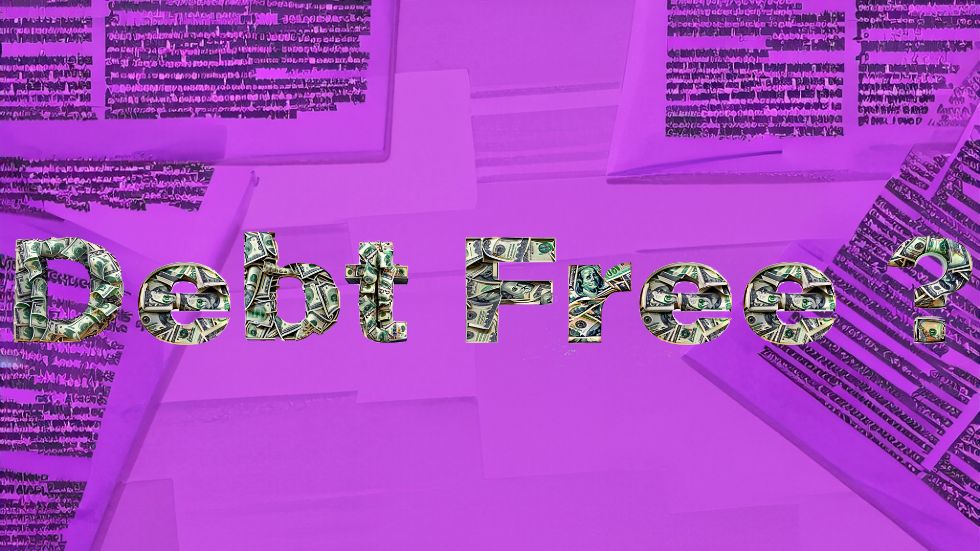Living a debt-free lifestyle is a goal that many people strive for, as it can provide a sense of financial security and freedom.
Being debt-free means that you don’t owe any money to lenders or creditors, allowing you to live within your means and save for the future. However, it’s important to understand that there are both pros and cons of being debt-free.
What does Being Debt Free mean?
Being debt-free means having no outstanding debt or loans that need to be repaid.
It means you have paid off all of your debts, including credit card balances, student loans, mortgages, car loans, personal loans, and any other types of loans or debts you may have had.
Is Being Debt Free The New Rich?
In recent years, there has been a growing movement towards becoming debt-free as a way to achieve financial freedom and security.
This trend has been fueled by the increasing awareness of the negative impact of debt on individuals’ finances and the economy as a whole.
More and more people are starting to realize that living a debt-free life not only brings peace of mind, but it also allows for greater flexibility and control over one’s financial situation.
This shift in mindset towards prioritizing debt elimination over conspicuous consumption is a reflection of a changing attitude towards wealth and what it means to live a fulfilling life.
Here are the advantages of being debt free:
- Increased financial security: When you’re debt-free, you don’t have to worry about making monthly payments to creditors or lenders.
- This can provide a sense of financial security and stability, knowing that you’re not at risk of defaulting on any debts.
- More financial freedom: Being debt-free also means that you have more freedom to make financial decisions that align with your goals and values.
- You can choose to save more money, invest in your future, or spend on things that matter most to you.
- Better credit score: While being debt-free may not necessarily lead to a higher credit score, it can help you avoid damaging your score with late payments or defaults.
- Less stress: Debt can be a significant source of stress for many people. Being debt-free can help you feel more relaxed and in control of your finances.
- No interest payments: When you’re debt-free, you don’t have to worry about paying interest on loans or credit cards, which can save you a significant amount of money over time.
- Improved relationships: Money problems can strain relationships with loved ones. Being debt-free can help you avoid financial stress and potentially improve your relationships with others.
- Easier to plan for the future: Being debt-free can help you plan for your future with greater clarity and ease.
You can focus on saving for retirement, a down payment on a house, or other long-term goals without the burden of debt holding you back.
Why can being debt-free be bad?
While being debt-free is often seen as a desirable financial goal, there are some situations where it may not be the best approach. While eliminating debt can offer a sense of financial security and freedom, there are some potential downsides to consider:
- Missed opportunities: Being debt-free may mean that you’re not taking advantage of opportunities to leverage debt for investments or other financial goals.
For example, taking out a mortgage to buy a home or a loan to start a business could potentially generate significant returns in the long run.
- Limited credit history: If you’re debt-free, you may have a limited credit history, which could make it more challenging to access credit in the future if you need it.
- No tax deductions: Certain types of debt, such as mortgage interest, may be tax-deductible, providing potential tax benefits. If you’re debt-free, you miss out on these deductions.
- No credit card rewards:
Many credit cards offer cashback or other rewards for making purchases, but if you’re debt-free and don’t use credit cards, you may miss out on these benefits.
- Possible missed career opportunities: Some career paths, such as law or medicine, require significant student loans to finance education. If you choose not to take on debt to pursue these careers, you may miss out on potential income and career opportunities.
- Opportunity cost: Being debt-free means that you’re not investing money in debt payments, but it also means that you’re not earning interest on that money. Depending on your investments’ returns, this could be a significant opportunity cost over time.
Conclusion
In conclusion, there are both advantages and disadvantages to being debt-free. While it can provide increased financial security, more financial freedom, and less stress, it may also mean missing out on opportunities, limited credit history, and potential opportunity costs.
Ultimately, the decision of whether to pursue a debt-free lifestyle is a personal one that requires careful consideration of your individual financial goals and circumstances.
Regardless of your choice, being mindful of your spending, budgeting wisely, and avoiding unnecessary debt can help you achieve financial stability and security in the long run.

